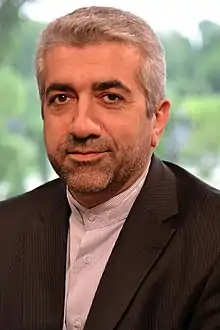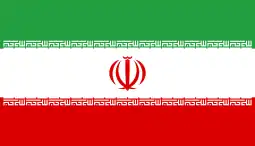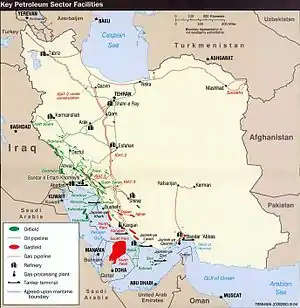| وزارت نيرو | |
.jpg.webp) | |
.svg.png.webp) Flag of the Ministry of Energy | |
| Agency overview | |
|---|---|
| Formed | 3 December 1936 |
| Jurisdiction | Government of the Islamic Republic of Iran |
| Headquarters | Tehran, Iran |
| Employees | 34,181 (2019)[1] |
| Minister responsible | |
| Website | Official Website |
 |
|---|
| Government of Islamic Republic of Iran |
Ministry of Energy (Persian: وزارت نیرو Vezârat-e Niru), Government regulates and manages the implementation of policies applicable to energy, electricity, water and wastewater services in Iran.
History and profile
Developed on 17 October 1936 (before the current constitution of Iran (1979)), the ministry was established to provide electricity to the city of Tehran.[2] On 20 May 1943 (before the current constitution of Iran (1979)), its portfolio was expanded to include water management in the country.[2][3] It was later renamed as the ministry of water and electricity on 17 March 1964.[2] Later on 17 February 1975, after the parliamentary approval it became the ministry of energy.[2] On 10 May 1978, under energy minister Jahanguir Mahdmina, the ministry's function was expanded to contain the construction and operation of nuclear power plants in the country.[2]
After the new Iranian constitution was formed (1979) some parliamentary changes took place for the duties of this ministry.[4] On 12 July 1980, some of the functions of the ministry were given to the ministry of agriculture.[2] On 7 March 1983, water management, and fair distribution of water resources were made part of the ministry of energy.[2]
Ministry of Energy is responsible for the management of supply and regulating the demand of water, electricity, energy, and wastewater services. It also promotes goods and services training, research and technological advancement, and rooting. The Ministry also plays a major role in the preservation of natural resources in Iran, environmental science, public health promotion, welfare and self-sufficiency for sustainable development of the country.[5]
The ministry has been on the sanction list of the European Union since 16 October 2012.[6]
Deputies
The ministry consists of five deputy Ministers as follows:[7]
- Deputy for Research and Human Resources
- Deputy for Planning and Economic Affairs
- Deputy for Electricity and Energy
- Deputy for Water and Wastewater
- Deputy for Support, Legal, and Parliamentary Affairs
Ministers since 1979
The last energy minister before the 1979 Iranian revolution was Jahanguir Mahdmina.
The energy ministers of Iran after the 1979 Iranian revolution:[2]
| No. | Portrait | Name | Took office | Left
office |
Party | Head of
government |
|---|---|---|---|---|---|---|
| 1 | Not an image | Abbas Taj | 18 February 1979 | 5 November 1979 | Independent | Mehdi Bazargan |
| 2 | Not an image | Hassan Abbaspour | 17 November 1979 | 28 June 1981 | Islamic Republican Party | Council of the Islamic Revolution |
| 3 |  |
Hassan Ghafourifard | 17 August 1981 | 28 October 1985 | Islamic Coalition Party | Mohammad-Javad Bahonar
Mohammad-Reza Mahdavi Kani (acting) |
| Mir-Hossein Mousavi | ||||||
| 4 | Not an image | Mohammad Taghi Banki | 28 October 1985 | 13 June 1987 | Islamic Coalition Party | |
| 5 | .jpg.webp) |
Bijan Zangeneh | 20 September 1988 | 20 August 1997 | Independent | |
| Mir-Hossein Mousavi | ||||||
| 6 | Not an image | Habibollah Bitaraf | 20 August 1997 | 24 August 2005 | Islamic Iran Participation Front | Mohammad Khatami |
| 7 |  |
Parviz Fattah | 24 August 2005 | 3 September 2009 | Mahmoud Ahmadinejad | |
| 8 |  |
Majid Namjoo | 15 November 2009 | 15 August 2013 | ||
| 9 |  |
15 August 2013 | 20 August 2017 | Hassan Rouhani | ||
| 10 |  |
Reza Ardakanian | 29 October 2017 | 25 August 2021 | ||
| 11 |  |
Ali Akbar Mehrabian | 25 August 2021 | Incumbent | Ebrahim Raisi |
See also
References
- ↑ جزییات تعداد کارمندان دولت در سال ۹۷ Tasnim News
- 1 2 3 4 5 6 7 8 Mir M.Hosseini. "Foundation of the Ministry of Energy". Fouman. Retrieved 26 January 2014.
- ↑ Nikravesh, Ardakanian and Alemohammad, Institutional Capacity Development of Water Resources Management in Iran: [http://www.gwp.org/Global/ToolBox/References/Capacity%20Development%20for%20Improved%20Water%20Management%20(UNESCO-IHE,UNW-DPC,%202009).pdf#page=169 Archived 18 October 2016 at the Wayback Machine
- ↑ History, Ministry of Energy, Retrieved 29 June 2010. Archived 3 January 2010 at the Wayback Machine
- ↑ Vision, Ministry of Energy, Retrieved 29 June 2010. Archived 26 November 2010 at the Wayback Machine
- ↑ "Persons referred to at point (2) of Article 1". Official Journal of the EU. October 2012. Retrieved 1 August 2013.
- ↑ Organization Chart, Ministry of Energy, Retrieved 29 June 2010. Archived 29 March 2010 at the Wayback Machine

